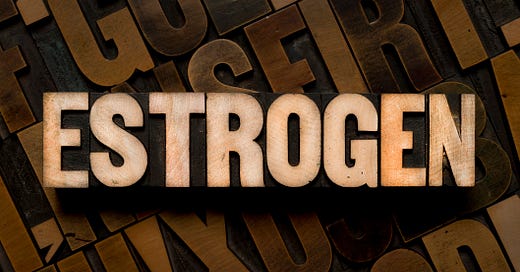When I post about what estrogen can and can’t do in menopause I often receive some concerning replies. I’ve previously covered concerns regarding progesterone here, but today I want to tackle estrogen.
I’ve actually been horrified at some of what I’ve seen. Apparently there are some practitioners who don’t know that more isn’t better and they have their patients on doses that I can only describe as the malpractice range.
Here’s a message I received a few weeks ago:
Thank you Dr. Jen! I read your Menopause Manifesto and it turned my world upside down, I was taking bio-identical hormones and it was costing me thousands of dollars each year (plus the expensive blood tests and the huge clinic fee each year), not much was helping. When I complained they simply jacked up my prescriptions. Then a naturopath told me I shouldn’t be on HRT and weaned me off, so I just felt worse. After reading your book, I found a qualified OB/GYN who is a member of the National Menopause Association (I’m getting the name wrong, but it’s the one you refer to in your book), it’s been 2 weeks, I’m already starting to feel better, I’m on fewer meds and everything is covered by medical (this month my prescriptions only cost $5.00!!). My new doctor was appalled by what I had been prescribed. Thank you so much for giving real and factual advice. Every woman should read this book!
So let’s walk through indications for estrogen, expectations, and doses. This applies to women who are 45 years or older, as the recommendations aren’t the same for women who are under the age of 45.
Am I taking estrogen for the right reasons, meaning can estrogen possibly help me?
(This assumes that it is safe for you to be taking estrogen).
Do you have bothersome hot flashes or night sweats? That qualifies. Estrogen is the gold standard here.
Do you have mild to moderate depression in the menopause transition (meaning you are still getting periods, but they are becoming irregular in some way?) While not an FDA approved reason to take estrogen, there seems to be enough data here to suggest it’s worth a try
Are you at high risk for osteoporosis? This doesn’t mean everyone in menopause, although I’m aware that there are some accounts that suggest if you have ovaries and don’t take estrogen that your bones will crumble and you are going to be dust in the wind before you know it.
If you are taking estrogen solely to help your memory, treat brain fog, protect your heart, to prevent dementia, or to protect muscle mass, then you are taking estrogen for the wrong reasons. Meaning the data does not support it. In this situation, every dose is wrong, because estrogen isn’t recommended! I think this is unfortunately not uncommon. People might start estrogen to help brain fog, and it doesn’t help so they keep upping their dose. And all of a sudden they’re using 150 mcg of transdermal estrogen and wondering why they don’t feel any better?
Am I Expecting Too Much of Estrogen?
Estrogen can help hot flashes. A lot. But it isn’t going to eliminate them altogether. Some estimates suggest about a 75% reduction might be possible with standard doses, so if you are promised a 100% response, then you have been misled. Setting expectations is key with any therapy. If you had 80 hot flashes a week and estrogen brings that down to 20 a week, we’d consider that a great result.
I suggest people keep a hot flash diary for a week before they start hormones, so they have concrete information about the number of hot flashes. Then they can look back at the two month mark and say better yes, or better no. Which leads us to another error that I see, people increasing the dose too soon without giving estrogen time to work.
As for depression, if it’s severe, then in general estrogen should not be the only therapy. Many people may also need an antidepressant and a psychologist as well.
Am I Actually Being Prescribed Too Much Estrogen?
Keep reading with a 7-day free trial
Subscribe to The Vajenda to keep reading this post and get 7 days of free access to the full post archives.




